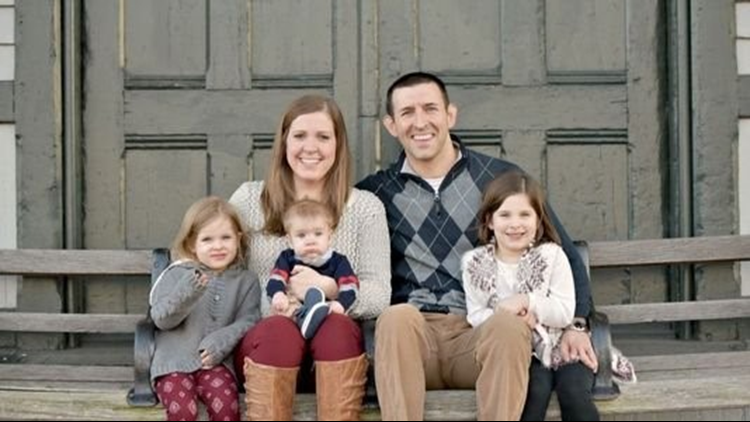It started with a phone call.
Randi Fremuth was so heartbroken by the stories of children being separated from their parents at the U.S./Mexico border in late June, she dialed Bethany Christian Services.
The 33-year-old mother of three from Chelsea was powerless to intervene in the Trump administration's zero-tolerance immigration policy in every way but one: She could open her home. She could care for a child for as long as it took to reunite that child with his or her parents.
"They’ve been torn from their families," she said. "They’ve been traumatized. But I feel like if we can at least take some of the sting or the burn out of it and lessen that trauma in any way, we have to.
"The decision was kind of obvious. At the end of the day, that’s just what is right. So that’s what we were going to do."
It's how Fremuth became one of 1,263 people to reach out that month to Bethany Christian Services, the only Michigan agency with a federal contract to care for children enmeshed in the family separation immigration crisis.
That's a huge increase in inquiries about foster care — roughly 3,846.9% — compared to each of the previous five months, when an average of 32 people contacted the agency.
"All of these people were interested in fostering separated children," said Morgan Greenberg, a spokeswoman for Grand Rapids-based Bethany Christian in an email to the Free Press.
Several other foster care agencies around the state reported a higher-than-normal number of calls and emails from concerned families eager to foster children in June, at the height of the crisis.
"The whole time span of that situation was 10 to 15 days," said Michelle Haskell from Samaritas, which also runs a program for refugee children. "In that time, we had 400 people call or email us. For some perspective, our average is about 10 to 20 a month, so that was pretty huge."
It's a 2,567% increase.
Maria holds her 4-year-old son Franco after he arrived at the El Paso International Airport Thursday night. The two had been separated for over 6 weeks after being caught entering the country illegally through Santa Teresa, New Mexico. Maria was held in an El Paso area detention facility while Franco was in New York City, the two are from Guatemala and plan to travel to Alabama to stay with relatives. (Photo: RUBEN R. RAMIREZ/EL PASO TIMES)
Wellspring Lutheran Services and the Ennis Center for Children told the Free Press they, too, saw upticks in inquiries from families interested in providing foster care.
Hoping to help
For Fremuth and her husband, Aaron Fremuth, becoming foster parents to an immigrant child during the crisis made sense.
"If the tables were flipped and my family and I were in trouble, ... and I went somewhere thinking I would be safer there and my children were taken away, ... at the very least, the only thing that would make that situation better would be to know that my kids were with a loving family," Randi Freemuth said. "That they were together, that they weren’t in a shelter somewhere or a detention center. They were in a home."
MISSION, TX - JUNE 12: A boy and father from Honduras are taken into custody by U.S. Border Patrol agents near the U.S.-Mexico Border on June 12, 2018 near Mission, Texas. (Photo by John Moore/Getty Images)
But Fremuths weren't a fit to foster a child through Bethany because they live in Chelsea, which is out of Bethany's service area, Fremuth said.
So she called Samaritas and enrolled in the agency's orientation program, learning about the hundreds of other refugee children in Michigan who need safe homes.
"There are 411 children in foster care in Michigan who either are unaccompanied refugee minors or have special immigrant juvenile status, which means they crossed the border unaccompanied and an immigration judge granted them special immigrant juvenile status that means they are in the country legally and are eligible for services under Michigan’s Unaccompanied Minor Refugee program," said Bob Wheaton, a spokesman for the state Department of Health and Human Services.
That's in addition to the 13,691 other children already in foster care in Michigan as a result of abuse/neglect or other factors.
Now that most of the immigrant children who were separated from their parents have been reunified, Bethany's Greenberg said the agency expects most of the people who inquired about fostering will drop out of the roughly four-month process of becoming a licensed foster care provider
A mother and son from Guatemala hold hands during a news conference June 22, 2018, following their reunion in Linthicum, Md., after being separated at the U.S. border. (Photo: Patrick Semansky, AP)
"Bethany assumes most will not complete the licensing process for placement of older unaccompanied or refugee youth," Greenberg said. "Most inquiries were clear they were only interested in the placement of a separated child."
But Haskell said Samaritas is encouraged by how many potential foster parents are going forward with training and screening anyway — people like the Fremuths.
"We decide with each new step that we’ll keep going," Randi Fremuth said. "We went through the orientation and said, 'Yeah, this sounds like something we can do.' ... I feel like with each step we’re making sure it’s right for us, and it’s right for our kids. We’re still considering it along the way."
Foster agencies have big need
Janet Reynolds Snyder, the executive director of the Michigan Federation for Children and Families in Lansing, said the increased interest is sorely needed.
"Bethany and Samaritas have definitely experienced a significant increase in inquiries from people wanting to become foster parents based on media attention to the need of the immigrant children separated at the border from their families," Reynolds Snyder said.
"These agencies are encouraging potential foster parents that the need overall for qualified foster parents is great. This is a real concern not only in Michigan but nationally as well."
Randi Fremuth said the family-separation crisis was so unsettling that she was driven to help, but it wasn't because she and her husband wanted to take immigrant children away from their parents.
Yolany Padilla is reunited with her son, Jeslin in the Seattle-Tacoma International Airport after nearly two months of separation, Saturday, July 14, 2018 in Seattle. (Photo: Rebekah Welch, AP)
"Our ultimate goal is to get these kids back with their families. Period," she said. "That’s it. There is no other end game.
"Some people have raised an issue with this idea of fostering the refugee children, saying that it’s along the lines of kidnapping. They feel like we’re saying what’s happening is OK because we can take care of this problem, that we can make this problem right by starting an adoption process. That is absolutely not my family's goal. Temporary foster care is exactly what we are trying to provide.
"They have a family. We’re not their family. We can be here to support them, but ultimately, the need to be with their family. ... I cannot sit by and let these children go to shelters or detention facilities because these kids aren’t pawns."
Of the 400 inquiries that came to Samaritas during that busy 15-day period in June, Haskell said 359 remain open cases. Twenty five families were out of state or in the Upper Peninsula, which are areas the agency doesn't serve.
And about 20 families, including the Fremuths, have already gone through the initial orientation since June and are moving forward in the process of becoming foster parents.
The three-year-old son (no name was given) of Ever Reyes Mejia, of Honduras, looks at his dad with a smile while being buckled into a car seat after his reunification with his dad after being separated for three months. The reunion happened inside the U.S. Customs and Immigration Enforcement in Grand Rapids, Michigan on Tuesday, July 10, 2018. They were being taken to an undisclosed location for more father and son bonding after their long separation. (Photo: Eric Seals, Detroit Free Press)
"Demand for foster care is huge in Michigan right now," Haskell said. "There’s always a big number of children who desperately need safe and loving homes, especially teenagers and children with severe behavioral issues and children with medical issues. Across the board, it’s tricky. Most people come and they want a toddler or a baby.
"We also have about 125 unaccompanied minors from the Central American border and from overseas. We are working on expanding to accommodate 50 to 60 more from the border."
Most of the children coming to Samaritas as unaccompanied refugee teenage boys, Haskell said.
"Michigan tends to see more teenage boys," she said. "Two-thirds of the refugee program in general are males. In a lot of countries, boys are more independent and are encouraged to be independent. They’re more likely to make a journey on their own. ... In the case of our Central American kids, they are fleeing gang violence. Gangs are trying to recruit them and they don’t want to be involved in that."
The refugee children Samaritas helps tend to come from countries like Honduras, El Salvador, Guatemala, as well as from the Horn of Africa, the Democratic Republic of Congo and Myanmar.
Adalicia Montecinos holds her year-old son Johan, who became a poster child for the U.S. policy of separating immigrants and their children, at a restaurant in Yojoa, Honduras. Johan arrived in San Pedro Sula and was reunited with his parents on a government bus. Captured by Border Patrol agents in March, Johan's father was deported and the then 10-month-old remained at an Arizona shelter. (Photo: Esteban Felix, AP)
"By in large, they are really great kids," Haskell said. "They are excited to be safe, and are excited to have opportunities that they have never had before. Some have never attended a school before. They are so excited to get an education and to support themselves."
Reynols Snyder said: "We are always looking for more loving foster homes for children."
Contact Kristen Jordan Shamus: 313-222-5997 or kshamus@freepress.com. Follow her on Twitter @kristenshamus.
For more info:
To learn more about how to become a foster parent, call 855-642-4543 (855-MICHKIDS) or go online to www.michigan.gov/hopeforahome.
►Make it easy to keep up to date with more stories like this. Download the WZZM 13 app now.
Have a news tip? Email news@wzzm13.com, visit our Facebook page or Twitter.



